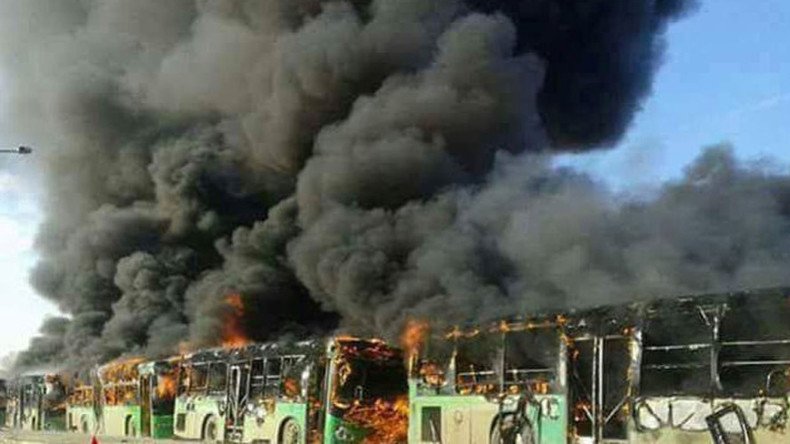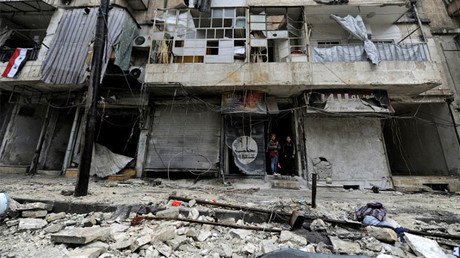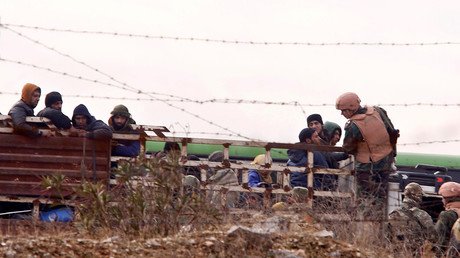‘UN Aleppo resolution no guarantee of success of evacuation plan as dangers remain’

As the UN Security Council (UNSC) is likely to find a compromise over a resolution on monitoring the evacuation of eastern Aleppo, RT discussed with experts possible dangers and consequences of the implementation of the plan.
The UN Security Council is expected to vote Monday. The need for a mission was highlighted by terror attacks on humanitarian workers and evacuees.
READ MORE: UNSC agrees ‘good text’ for resolution on Aleppo, voting to be held Monday - Churkin
If this resolution passes, it would be a sign of greater cooperation between all countries fighting terror, suggests former British MP Matthew Gordon Banks.
“There have been signals after signals that we should have been seeing greater cooperation much earlier than this. However, looking forwards with a bit of luck all sides are going to agree in the Security Council, and we may then be able to see a greater number of countries working together to improve the lot of the ordinary Syrian citizen on the ground,” he told RT.
In Banks’ opinion, the UN needs to play a much bigger role in resolving the Syria crisis.
“If you can’t ensure the safety of aid workers, such as organization like OXFAM, the aid agencies are quite simply not going to go in. Security on the ground is absolutely paramount. This is…years after the invasion of Iraq, and it really is a terrible human tragedy. Instead of arguing about whether President Assad stays in the UNSC, it’s time the outgoing Secretary General and his team and the Security Council revisit attempts to secure the ground for the aid agencies to go into Mosul and help,” he said.
The former British MP suggested that UN troops on the ground should be considered as an option.
“Years ago the US at the head of the coalition invaded Iraq, and the sole aim was regime change. The international community had no plans to deal with a humanitarian situation that was bound to follow. The US in particular and the UN made some extremely bad appointments, and we found that the legitimate government in Baghdad instead of looking after the three main areas of Iraq that existed then, saw the country disintegrate into anarchy. We had some wasted years with one particular Iraqi PM, and I don’t think the Western world has put enough pressure on Iraqis to improve the situation. I am reluctant to say that we should be seeing more UN troops on the ground in order to improve the security for aid workers, but it has to be considered as an option,” he said.
The resolution would not mean that Russia and America are finally on the same page on Syria, argues Tim Anderson, senior lecturer in political economy at the University of Sydney, and author of "The Dirty War on Syria."
Tim Anderson: It means that they both have interests in this type of resolution. You can understand the hesitance of Russia with the initial text by France because the three of the five permanent members of the UNSC have been arming and financing the Al-Qaeda groups in Syria. There is great suspicion about that. Part of that is a propaganda war in support of those groups trying to pretend that they are humanitarian heroes and so on. So, the information war is very important to them, and of course only a couple of days ago Samantha Power was talking very rabidly against the role of Russia there. But on the other side, Syria and Russia have an interest in moderating a lot of the disinformation that has been put out the recent days. So, the international observers - there is no opposition in principle to it, but how it happens, what level of battlefield supervision there, is the question of danger that is still there…
RT: The UN Task Force chief for Syria has said they are ready to monitor the evacuations, but there are security concerns. How much danger are they in?
TA: There is certainly danger there….The agreements have been breached so many times by the Al-Qaeda groups, I mean, they have a habit of breaching these sorts of agreements. We’ve seen it in lots of places where the Syrian army has made agreements that have been breached and the most recent one is burning these buses and killing one of the drivers that was part of a deal worked out with the Al-Qaeda groups. I say that because they changed their name several times. That was part of the deal and burning of these buses is a sign that these agreements can be very fragile.
RT: The rebels have torched the buses that were supposed to evacuate civilians. Will this change anything from a Western perspective as to how they look upon these ‘rebels’?
TA: Some independent people had confirmed that it was armed groups that had burned those buses and you heard all the Islamist chants when the buses were being burned. The Western media has already reported from unnamed activists with these groups that it was civilians that burned those buses. So, they constantly present misinformation and the Western media keeps carrying that. So, there is a great deal of misinformation about the whole situation in Aleppo but also about this incident of burning of the buses. So, in some aspects, there is an interest on the Syrian side too for more international observers. There are, of course, journalists who are reporting on this, but they have been attacked and marginalized. But there is Syrian and Russian interest in having some more independent reporting of what is going on.
Massoud Shadjareh, Chair of the Islamic Human rights commission, told RT: "The way the UN has dealt with this issue and the other issues that are going on in comparison, for example, to Yemen and Syria or the difference between the way that we are looking at the Syrian situation in comparison to what is happening in Iraq - it really seems that it is buying into this misinformation and sort of propaganda that is coming from the Western mainstream media. And it is also very dangerous. What we need to recognize is that this is not an issue of a tyrant going mad, this is an issue of a civil war being created, fueled and financed."
RT: The evacuation of villages where hostages are being held was part of an agreement the militants put forward. Why do they seem to be so determined to derail this deal?
TA: It is a good question because now, of course, there are remaining 5,000 or so of the armed groups and their families waiting for the evacuation but that is contingent on the evacuations for from al-Foua and Kafraya. It could be simply because there is fragmentation in their command. They are fighting among each other in Idlib at this moment, and a lot of this has to do with who betrayed them and who was responsible for losing Aleppo and so on. So, it could be that it is simply the infighting among them.
The statements, views and opinions expressed in this column are solely those of the author and do not necessarily represent those of RT.














